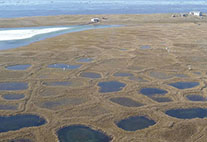German-Russian cooperation: Universität Hamburg hosts the CarboPerm Conference
27 February 2015, by Franziska Neigenfind

Photo: UHH/CEN/I. Preuss
Last week, roughly 80 researchers came together at Universität Hamburg to discuss permafrost and the climate. The goal was ...
Last week, roughly 80 researchers came together at Universität Hamburg to discuss permafrost and the climate. The goal was to arrive at an interim balance on the German-Russian CarboPerm project, funded by Germany’s Federal Ministry of Education and Research.
Topics addressed at the conference included the origins of fossil carbon, the age and quality of organic deposits, and the accelerated microbial transformation of carbon in permafrost soils as a result of climate change. At the same time, the conference provided an opportunity for intensive exchange between the German and Russian research teams and to discuss their mutual contribution to PANGEA, an international database in which the results of Earth system and climate research are collected and made available to the public. “That means that now anyone with internet access can follow what we’re doing and where we’re working,” explains Sebastian Zubrzycki from Universität Hamburg’s Institute of Soil Science.
A further common goal: supporting the next generation of researchers. “It’s important to get young researchers involved from the beginning,” stresses Irina Fedorova from St. Petersburg State University. With that objective in mind, a joint Master’s program between St. Petersburg and Hamburg is currently being planned. The program will tentatively be rolled out in 2017 and will offer 20 students the opportunity to familiarize themselves with field research in polar regions.
“German-Russian cooperation in permafrost research addresses essential open questions on the significance of the Arctic for the climate system. In this regard, especially the Siberian tundra landscapes are pivotal to our climate,” says Professor Eva-Maria Pfeiffer, who has been involved in German-Russian joint projects for several years as Director of Hamburg’s Institute of Soil Science.
